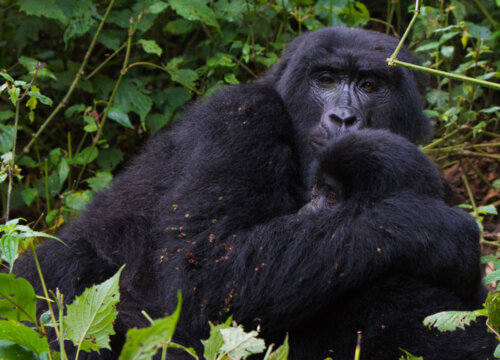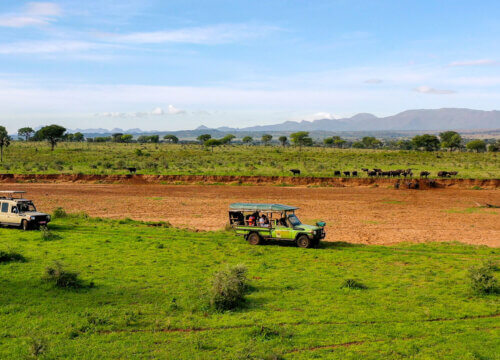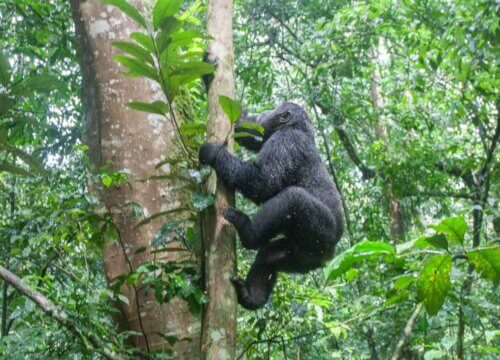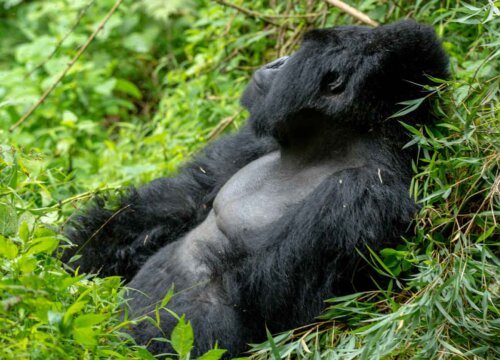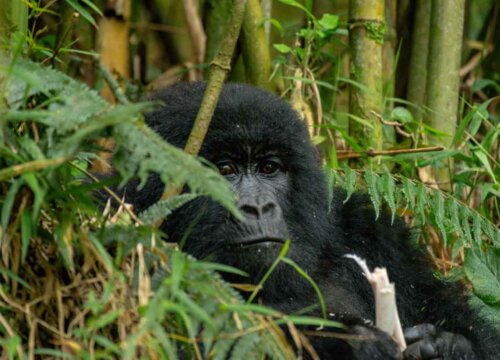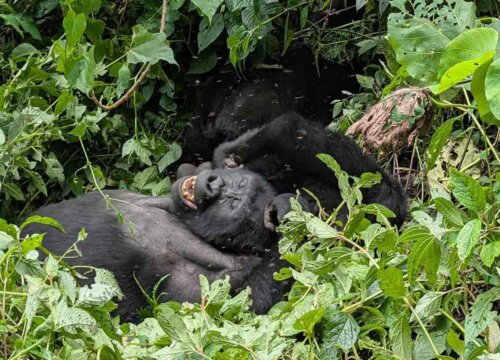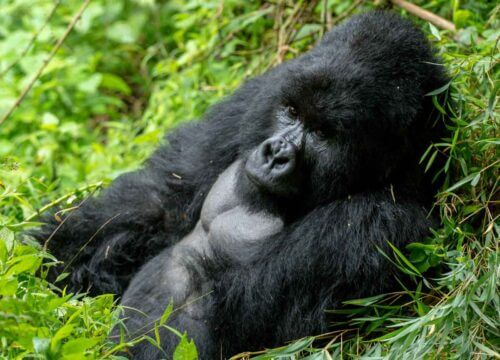Is gorilla trekking safe for pregnant women in Uganda?
Is gorilla trekking safe for pregnant women in Uganda?
Yes Gorilla trekking in Uganda is an incredible experience and if you are pregnant, you may be wondering if it is safe for you to embark on this adventure. While gorilla trekking can be physically demanding, with proper preparation and consideration, it is possible for some pregnant women to enjoy this unique experience. However, it is essential to prioritize your health and safety as well as that of your baby.
Gorilla trekking involves hiking through dense forests and mountainous terrain to observe mountain gorillas in their natural habitat. The treks can range from an hour to several hours depending on the location of the gorilla families on that particular day. The trails can be steep, muddy and unpredictable, requiring a moderate level of fitness.
For pregnant women, the first step is to consult with your healthcare provider before making any decisions. They can assess your overall health and the stage of your pregnancy to determine whether gorilla trekking is a safe option for you. Generally, women in the first or second trimester with no complications may have an easier time managing the physical demands of gorilla trekking compared to those in their third trimester. If you do decide to go gorilla trekking while pregnant, there are several ways to make the experience more manageable.
Hiring a porter is highly recommended because they can help carry your backpack and provide support during challenging sections of the trail. Additionally, consider requesting a shorter trek when booking your gorilla trekking permit. Park authorities are usually accommodating and may assign you to a gorilla group that requires less strenuous hiking for pregnant woman.
It is also important to stay hydrated, wear comfortable and sturdy footwear and pack light snacks for energy. Take breaks as needed and communicate with your guide about how you are feeling throughout the trek. Your safety and comfort as a pregnant woman should always come first.
Keep in mind that Uganda’s Bwindi Impenetrable Forest and Mgahinga Gorilla National Park are at higher altitudes which can sometimes cause shortness of breath or fatigue factors that might affect pregnant women more significantly. Be sure to monitor how you are feeling and avoid pushing yourself too hard.
How to plan for gorilla trekking in Uganda and Rwanda as pregnant women
Consult your doctor first. Before making any travel plans, it is crucial to consult your healthcare provider. Discuss your pregnancy stage, overall health and the physical demands of gorilla trekking. Your doctor can advise whether this activity is safe for you and might provide tips for managing altitude changes, physical exertion and travel-related concerns. If you are in your first trimester or nearing the end of your pregnancy, your doctor might suggest postponing the trip to avoid unnecessary risks.
Choose the right time to visit. The best times for gorilla trekking in Uganda and Rwanda are during the dry seasons that is June to September and December to February. During these months, the trails are less muddy and easier to navigate, which is particularly helpful if you are pregnant. Avoiding the rainy season reduces the chances of slipping on wet trails and makes the trek more manageable.
Select a suitable gorilla trekking location. Both Uganda and Rwanda offer exceptional gorilla trekking experiences but the terrain and trekking conditions differ slightly between the two countries. The Volcanoes National Park in Rwanda is known for its relatively shorter treks compared to Uganda. The gorilla families tend to be closer to the starting points, making it a more suitable option for pregnant women who may prefer a less physically demanding trek. On the other hand, Bwindi Impenetrable Forest National Park in Uganda offers incredible gorilla encounters but is known for its steeper and more challenging terrain. However, with proper planning, you can request to visit a gorilla family that is closer to the starting point. Discuss your preferences with Giant Holiday Safaris so that we can arrange a trek that aligns with your physical capabilities.
Book with a reputable tour operator. Working with an experienced and reputable tour operator like Giant Holiday Safaris is essential when planning a gorilla trek as a pregnant woman. Inform us about your pregnancy so that we tailor the experience to your needs. We help secure gorilla trekking permits for gorilla families that are easier to reach and arrange for additional support such as porters to carry your belongings or assist you during the trek.
Consider hiring a porter. Hiring a porter is highly recommended for pregnant women. Porters are local guides who can carry your backpack, water or other essentials, allowing you to focus on navigating the trail safely. They can also provide extra support if you need help walking through challenging sections of the trek.
Pack wisely. Packing appropriately will make your trek more comfortable and enjoyable.
Pace yourself. Gorilla trekking can be physically demanding especially if you are not used to hiking or walking long distances. As a pregnant woman, it is important to listen to your body and pace yourself. Do not hesitate to take breaks whenever needed. Your guide will understand and accommodate your needs. If you feel tired or unwell at any point during gorilla trekking, communicate with your guide immediately.
Prepare for altitude changes. Both Uganda and Rwanda have high-altitude regions where gorilla trekking takes place. Altitude changes can sometimes cause shortness of breath or fatigue, especially during pregnancy. To minimize discomfort, spend a day or two acclimatizing in the area before your trek.
Stay close to medical facilities. When choosing accommodations, opt for lodges or hotels located near medical facilities or clinics. This ensures you have access to medical care in case of an emergency. Many high-end lodges in Uganda and Rwanda are well-equipped to cater to travelers’ needs and can assist with arranging medical attention if necessary.
Pregnancy does not have to stop you from enjoying incredible adventures like gorilla trekking. Take time to soak in the beauty of the lush forests, listen to the sounds of nature, and cherish the magical moment of seeing mountain gorillas up close.
What to pack for gorilla trekking as pregnant women
- Comfortable Clothing like long-sleeved tops and full-length pants will protect you from bugs and scratches as you navigate through the forest. Opt for maternity-friendly options with elastic waistbands or adjustable fits to ensure comfort throughout the trek.
- Invest in sturdy, waterproof hiking boots with excellent ankle support. The terrain can be uneven and slippery, so shoes with a good grip are essential to keep you steady and safe.
- A maternity support belt can be a lifesaver especially if you are trekking in your second or third trimester. It helps reduce strain on your lower back and provides extra support for your growing belly during the hike.
- Pack a lightweight, waterproof jacket or poncho. Staying dry will keep you comfortable and prevent unnecessary stress on your body.
- Carry a reusable water bottle or hydration pack and ensure you drink frequently. Pack healthy, energy-boosting snacks like nuts, dried fruit or granola bars to keep your energy levels up throughout the trek.
- Bring a pregnancy-safe insect repellent with natural ingredients like citronella or eucalyptus oil to avoid any harsh chemicals.
- Bring a wide-brimmed hat, sunglasses and pregnancy-safe sunscreen to shield your skin from harmful UV rays.
- Choose a lightweight backpack to carry all your essentials without straining your back.
- Consider packing a small portable seat or cushion because it will give you a comfortable place to rest when needed without sitting directly on the ground.
- Carry any prescribed medications or prenatal vitamins you may need during the trek.
- Do not forget to pack a lightweight camera or binoculars.
What is the best season to do gorilla trekking as a pregnant women?
Gorilla trekking is an unforgettable experience and with Giant Holiday Safaris, you are in great hands. If you are pregnant, the best season for gorilla trekking would ideally be during the dry months which are June to September and December to February. During these periods, the trails in Uganda and Rwanda are less muddy and slippery, making the trek more manageable and safer for you.
As a pregnant woman, it is essential to prioritize your health and comfort. The dry season not only ensures better trekking conditions but also offers clearer views of the lush landscapes and the majestic gorillas in their natural habitat. Giant Holiday Safaris tailors your experience to suit your needs, ensuring shorter treks or opting for groups that match your pace.
Explorer More Safaris
- 14-Days Uganda Safari Gorilla Chimpanzees and Wildlife
- 12 Days Gorillas and Chimpanzees Wildlife Safari
- 10 days best of uganda primates & wildlife safari
- 6 Days Gorillas and Chimpanzee Trekking Safari
- 3 Day Bwindi Gorilla Trekking Safari
- 4 Day Uganda Gorilla Trekking and Wildlife Safari
- 4 Days Gorilla Trekking and Adventure Safari
- 5 Days Uganda Gorillas and Chimpanzee Tracking Safari
- 4-Day Rwanda Gorilla Trekking and Golden Monkey Tracking Safari
- 5 Day Gorilla Habituation and Chimp Trekking
- 4-Day Uganda & Rwanda Gorilla Trekking Tour
- 3 Days Bwindi Gorilla Trekking Ugnada from Rwanda
- 10 Days Uganda Primates and Game Safari

